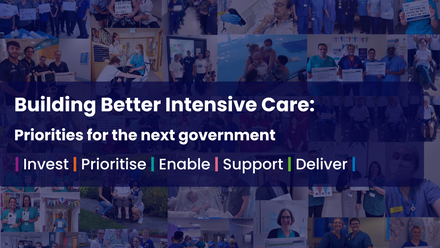Our Response to the Health Select Committee's Report
The Intensive Care Society welcomes the latest report from the Health and Social Care Committee which explicitly raises the challenges faced by those who provide care to the sickest patients in UK hospitals. The content of the report highlights the challenges critical care has faced for years and brings to the forefront the urgent need for transparent government action to provide the means for our workforce to deliver high quality care to those who are in need.
Despite limited post pandemic investment, we still have one of the lowest numbers of funded critical care beds per head of population in Europe (1), insufficient numbers of intensive care doctor training posts and a wider workforce deficit across all areas of critical care.
Recruitment remains inadequate to meet current and future demands on critical care services and is hampered by an absence of government policy and continued underfunding which in turn makes it difficult to fill these much-needed vacancies.
The pandemic brought a need to dilute staffing ratios in order to cope with demand, however, this had a profound impact staff experience and wellbeing and their ability to deliver safe high-quality critical care to patients.(2) It is imperative that we now return to the correct staffing standards for nurses, doctors, AHPs and Pharmacists as set out in GPICS (3), and that any increase in demand results in an increase in the workforce.
The pandemic taught us that critical care capacity (both beds and staffing) impacts beyond the walls of an intensive care unit, including unplanned (emergency) admissions, planned admissions (i.e., elective surgery, cancer care, transplants) and those patients who may benefit from admission to ICU but remain on general wards as a result of capacity issues. We are faced with 6.48 million patients (April 2022) on the waiting list for planned surgery and with the current rise in COVID patients in hospital and winter on the horizon, this number is likely to grow.
The Intensive Care Society calls upon the Government to act decisively and rapidly in response to this report and begin to reverse the identified deficiencies in the provision of critical care including:
- A robust plan focussing on the retention of current critical care staff whilst caring for an exhausted workforce and providing them with the tools they need to thrive at work, including the reduction of unsustainable workloads
- Continued investment in the breadth of staff wellbeing initiatives including leadership development to build environments conductive to raising staff morale and enabling staff to thrive and want to stay working within the NHS
- Taking appropriate steps to rectify the challenges faced by staff around complex pensions and fixing terms and conditions of employment
- An investment in increasing critical care beds and the necessary staff required – a bed without staff is like trying to drive a car without an engine
- Urgent planning to provide a workforce of the future, removing barriers which reduce our ability to train, recruit and attract talent both nationally and internationally
Intensive Care Society President, Dr Stephen Webb, said “This report further highlights the need for essential investment in our healthcare system. The pandemic pushed staff to breaking point and there must be appropriate steps taken to protect the workforce we have and ensure they are given the tools they need to thrive at work which in turn enables us to deliver the best possible care to our patients.”
Intensive Care Society’s President Elect, Dr Steve Mathieu, said “We need to stop paying lip service to staff wellbeing and start fixing the key issues we continue to face. Top of that list is achieving compliant and safe staffing standards. Only then can we ensure our teams feel safe, supported, have career development opportunities, want to stay in the job they have trained many years to do and continue to inspire the next generation to join our specialty.
References- Intensive Care Society ICU Staffing, Occupancy and Capacity.
- Joint Position Statement on Critical Care Staffing Standards.
- ICS/FICM Guidelines for the Provision of Intensive Care Medicine Version 2.1.
~ENDS~



